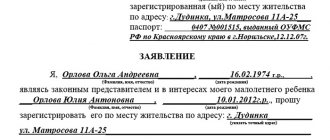As a rule, every child is registered somewhere at their place of residence. There may be a need or someone's desire to remove the child from the apartment or evict them. Is this possible, if possible, then how? Let's look at it in order.
ATTENTION: our housing law lawyer will explain to you during a consultation on housing issues when it is possible to evict a former family member along with the child, and when it will become difficult to discharge a minor.
Is it possible to expel a minor child from the apartment?
You can discharge a child from an apartment if he has changed his place of residence with his parents. If the parents live together with the child, then it is impossible to discharge him from the apartment.
In a situation where the marriage between the parents is dissolved and the child lives with one of the parents not at the place of registration, it is impossible to remove him from the registration register until he reaches the age of majority, even if the owner of the apartment is only one parent with whom the child does not live .
If a child is registered in an apartment that does not belong to the parents by right of ownership, then the child can be discharged from the apartment at the request of the owner.
If both parents agree to remove the child from the apartment, they must contact the appropriate authority and remove the child from the register. If one of the parents is against it, then, under certain conditions, the child can be forcibly discharged through the court. However, when it comes to minors, it is not always easy to remove the child from the apartment. The court will take into account the reasons for deregistration, where the child lives, why he does not live at the place of registration, etc.
USEFUL: read how to evict a registered person from an apartment, and also watch a video about how a mother recognized her daughter as having lost the right to housing
How to expel a stranger's child from an apartment
In accordance with Art. 69 of the Housing Code of the Russian Federation, family members of a tenant of residential premises under a social tenancy agreement include his spouse living with him, as well as the children and parents of this tenant. Other relatives and disabled dependents are recognized as family members of the tenant of the residential premises under a social tenancy agreement if they are settled by the tenant as members of his family and run a common household with him.
The privatization process involves granting the child ownership rights to the share if he participated. To discharge a minor child from a privatized apartment, guardianship permission is required. A condition for issuing a permit is the need to provide the child with similar housing (share). At the same time, guardianship representatives do not take into account social and subjective factors: housing in a more prestigious area, obtaining benefits from purchase and sale, etc. All that matters is the square. The area provided to a minor must be no less than that which belongs to him by right of shared ownership.
This is interesting: Delay of Social Payments in Adler to Veterans of Labor
How to discharge a child from an apartment with the consent of the parents?
If the child’s parents agree with his removal from the apartment, then deregistration is carried out on a voluntary basis.
If a child is under 14 years old, parents can remove him from the register. If the child is 14 years old, then with the consent of the parents, the child can deregister himself by submitting an application in person.
Deregistration can be made by submitting an application for registration at a new place of residence or an application for deregistration at the place of residence.
To deregister, you must submit one of the above applications. You may also need to submit the following documents along with your application:
- birth certificate or passport (if over 14 years old) of the child
- identification documents of legal representatives, guardian
- document-basis for the child's placement
- consent of the second parent to move in the child
How can an owner remove a minor child from an apartment?
- We take an extract from the passport office stating that the child lives with his parents. To do this, we provide a passport, a child’s birth certificate and a social contract. renting an apartment.
- In the accounting department of the passport office we also take a personal account.
- We contact the guardianship authority to obtain consent to remove the child from the apartment. The following documents are attached to the application:
- social contract hiring;
- passports of both parents (legal representatives);
- child's birth certificate;
- new social contract hiring (or buying and selling);
- certificate of registered persons (see clause 1);
- personal account;
- technical passport of the new and old place of residence.
- Within 14 days, all documents are checked and the guardianship authority issues a permit.
- Once permission is received, the child can be discharged.
- We contact the Federal Migration Service at the new place of residence with an application for registration of the child (also filled out by the parent or legal representative). We attach to the application the parent’s passport, the child’s birth certificate, a certificate of departure from the previous place of registration, permission from the guardianship authority, a certificate of ownership of the apartment (if in the name of the child);
- We fill out the arrival sheet and wait for registration.
16 Mar 2021 uristlaw 206
Share this post
- Related Posts
- Banks That Do Not Cooperate with Bailiffs 2020
- Which Income Code to include in Certificate 2 of Personal Income Tax for Compensation for Additional Vacation Days
- Maternity Capital Loan Without Waiting 3 Years With Bad Credit History
- Rent Arrears Orenburg
Procedure for eviction of a minor child through court
To remove a child from an apartment through the court, you must complete the following steps:
- Prepare and submit to the district court at the location of the apartment a claim for termination of the right to use the residential premises. If the child lives in the apartment, then it is necessary to file a demand for eviction
- It is necessary to collect and attach copies of evidence that substantiate the plaintiff’s claims to the claim.
- Take part in the trial and wait for the court's decision
- If the plaintiff’s claim is satisfied, all that remains is to wait for the decision to come into force and obtain a writ of execution if the child’s eviction is required
- In order to discharge a child, a court decision must be presented to the registration authority
A child cannot always be recognized as having ceased to have the right to use housing, much less evicted, and, accordingly, he cannot always be discharged from the residential premises.
If the child’s parents are the owners of the apartment, then it is impossible to discharge him from the apartment until he reaches adulthood. Even if the parents are divorced and the child does not live at the place of registration, it will still not be possible to discharge him. In this case, the family relationship between parents and child does not end, even if the parents are divorced.
If the apartment is municipal, then in this case it is taken into account whether the minor left for another permanent place of residence, whether his departure was forced, whether he is being prevented from using the premises, or whether he nevertheless voluntarily left with his parents. If the child left voluntarily, then a claim may be filed to recognize him as having lost the right to use the residential premises. If a minor is temporarily or forcibly absent from the apartment, then it will not be possible to discharge him from it.
Discharge someone else's child
Good afternoon. In the statement of claim, indicate the legal representative of the child - one of the parents or a person replacing him. If the child has reached the age of 14, then he takes part in the trial together with his legal representative. State the grounds for terminating the right of a minor child to use residential premises. Such grounds may be, for example, termination of a contract for the gratuitous use of housing, transfer of ownership of residential premises to another person, termination of family relations with the parent of a minor child, also registered in the residential premises (except in the case of the residential premises belonging to the parent). If a minor child lives in a residential area, indicate the requirement to evict the child. The court will involve the prosecutor in the case to give an opinion on the request to evict the minor (Article 45 of the Code of Civil Procedure of the Russian Federation). The statement of claim must be accompanied, in particular (Article 132 of the Code of Civil Procedure of the Russian Federation): - a receipt for payment of the state duty in the amount of 300 rubles. (Clause 3, Clause 1, Article 333.19 of the Tax Code of the Russian Federation); - an extract from the house register; - documents confirming the circumstances on which the plaintiff bases his claims. If we are talking about terminating the family relationship between the child’s parent and the owner, then written evidence and witness testimony must be provided. Also provide the court with documents confirming your ownership of this residential premises.
This is interesting: Deduction for Chernobyl victims for personal income tax
How to discharge someone else’s minor child from your own home, who is registered with the guardianship and trusteeship authorities, who is not a member of the owner’s family, does not live in it, and is not a relative of the owner, or rather, no one lives in the house (since disabled all communications: gas, water, electricity), the child’s guardian is registered and lives at a different address together with this child, who has temporary registration at the guardian’s address.
How to file a claim to evict a child?
The claim for eviction is drawn up in accordance with the requirements of Art. 131 of the Code of Civil Procedure of the Russian Federation, the text of which must contain the following information:
- name of the district court in which the lawsuit will be filed
- information about the plaintiff, namely, full name, address, telephone number
- information about the defendant, i.e. about the child, his full name, residential address, date and place of birth, as well as information about his legal representative, information about other defendants indicating their full names and addresses. date and place of birth, place of work, one of the identifiers (TIN, SNILS, etc.)
- the document will be called a statement of claim for eviction
- The most important thing in preparing a claim is the correct and clear presentation of all the circumstances of the case, the plaintiff’s motivation for his claims, including legal argumentation
- the pleading part of the claim must contain a clearly formulated demand for the eviction of a specific child from a specific residential premises
- the claim must be accompanied by written evidence, which must be listed in the appendix
- at the end the claim must be signed by the plaintiff
USEFUL : see more tips on filing a claim, and also order a ready-made version from our lawyer
Execution of decisions on eviction and deregistration of children
After the court decision on eviction has entered into force and there has been no voluntary action to evict children from the home, the plaintiff must apply to the court to obtain a completed copy of the court decision on entry into force and a writ of execution to evict the children.
The writ of execution must be presented to the bailiffs to initiate proceedings and take action to forcibly evict children from the occupied residential premises. It is unlikely that an eviction order will only affect children as children are typically evicted with their parents, so bailiffs will work with the children's legal representatives to notify them of the eviction. In the absence of voluntary actions to leave the residential premises, persons together with their children will be forcibly evicted.
In order to discharge minors from housing, a court decision must be presented to the registration authority, on the basis of which the children will be discharged.
When is it impossible to discharge children from residential premises?
It is impossible to expel children from the living quarters who are its owners, i.e. the housing belongs to them on the right of ownership in full or they have a share in the right of ownership of it.
It will also not be possible to register children if one of the parents does not agree to the other parent deregistering the children at their place of residence.
In the case of children living with their parents in an apartment under a social tenancy agreement. To discharge a child from public housing, the consent of both parents and the guardianship authorities is required.
Discharge the child from the apartment
To remove a citizen who has not reached the age of majority from living space when selling his or her apartment, you need to prepare certain documentation. Again, the consent of the board of trustees to the transaction and deregistration is required. Without this permission, the purchase and sale agreement will be canceled by the court, because the rights of a minor are violated. Within fourteen days, the board of trustees will issue a verdict, set out in writing.
We recommend reading: Fees for Major Repairs of Apartment Buildings Law
Help from a housing lawyer in Yekaterinburg
The circumstances that make it necessary to evict a child from a home can be very different and the courts do not always make the same decisions, seemingly under similar circumstances.
By contacting the lawyers of our Law Office “Katsailidi and Partners”, you can count on:
- consultation on the issue of eviction of a child, taking into account your circumstances
- conducting mediation procedures with the participation of both parents or potential plaintiff and defendant
- preparing a lawsuit for eviction
- representing the client's interests in court
- request for additional evidence to be presented to the court
- appealing a court decision
- obtaining a court decision and writ of execution and presenting them to the relevant authorities for the eviction of the child and deregistration
- provision of other legal assistance in relation to the issue of eviction of a child
Please note that the truth can be both on the side of the plaintiff and on the side of the defendant. Our lawyers represent the interests not only of persons wishing to evict children, but also the interests of children and legal representatives who act in the interests of minors.










